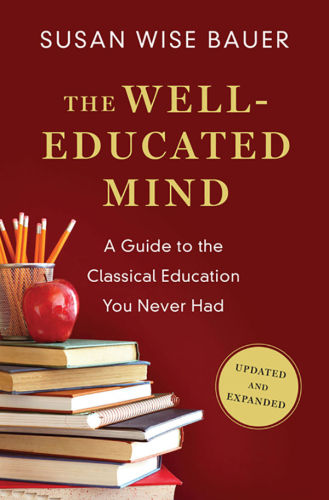
The Well-Educated Mind
A Guide to the Classical Education You Never Had (Updated and Expanded)
کتاب های مرتبط
- اطلاعات
- نقد و بررسی
- دیدگاه کاربران
نقد و بررسی

July 14, 2003
Bauer's The Well-Trained Mind
(which she co-wrote with Jessie Wise) taught parents how to educate kids; her latest is designed for adults seeking self-education in the classical tradition. Reading—sustained, disciplined and structured—is her core methodology, so she starts with tips on improving reading skills and setting up a reading schedule (start with half-hour sessions four mornings a week, with daily journal writing). Reading is a discipline, like meditating or running, she says, and it needs regular exercise. To grow through reading—to reach the "Great Conversation" of ideas—Bauer outlines the three stages of the classical tradition: first, read for facts; then evaluate them; finally, form your own opinions. After explaining the mechanics of each stage (e.g., what type of notes to take in the book itself, or in the journal), Bauer begins the list section of the book, with separate chapters for her five major genres: fiction, autobiography/memoir, history/politics, drama and poetry. She introduces each category with a concise discussion of its historical development and the major scholarly debates, clearly defining all important terms (e.g., postmodernism, metafiction). And then, the pièce de résistance: lists, in chronological order, of some 30 major works in each genre, complete with advice on choosing the edition and a one-page synopsis. Bauer has crafted a timeless, intelligent book. (Aug.)Forecast: Bauer's book has a large potential readership. For serious self-educators, it's a well-balanced, long-lasting reading program. For book-clubbers, it's a brilliant guide on to how to analyze any given literary work—even if it's not on Bauer's list. And for college students in trouble, it's a quick gloss of books there wasn't time to read, plus sound advice on spotting critical fallacies.

September 1, 2015
Humanities home schooling for adults. Bauer (The History of the Renaissance World: From the Rediscovery of Aristotle to the Conquest of Constantinople, 2013, etc.) is a critic of educational institutions: high schools teach students to read to the 10th-grade level, enough to master Stephen King, newspapers, and Time; college graduates often feel "a nagging sense of their own deficiencies." In graduate school, the author once earned an A for a presentation on Moby-Dick, a novel she hadn't even finished. What should you do, she asks, "if your mind is hungry, but you feel unprepared, under-educated, intimidated by all those books you know you should have read?" Her prescription: read intensely for half an hour, four days a week, and analyze according to the trivium: "First, you'll try to understand the book's basic structure and argument; next, you'll evaluate the book's assertions; finally, you'll form an opinion about the book's ideas." Bauer offers an overview and specific questions for major literary genres: the novel, autobiography and memoir, history, drama, poetry, and science, along with a chronological list of books she deems important, each with her brief commentary. Although the author claims that no list of "Great Books" is canonical, her own echoes works endorsed by Mortimer Adler, innovator of the Great Books curriculum at the University of Chicago; and Harold Bloom, champion of the Western canon. The third part of Bauer's trivium is likely to cause the most difficulty: how are readers to know if their opinions are "correct"? She recommends getting a reading partner to discuss ideas, "skimming an essay or two of criticism," or seeking an appointment with a faculty member at a nearby college, a possibility that seems both unrealistic and frustrating for both parties. Despite her disdain for schools, her book would be most useful in a classroom setting, where discussions, essay writing, and a teacher's expert guidance could foster the critical thinking that Bauer so passionately exalts. A useful resource for highly self-motivated readers.
COPYRIGHT(2015) Kirkus Reviews, ALL RIGHTS RESERVED.

























دیدگاه کاربران